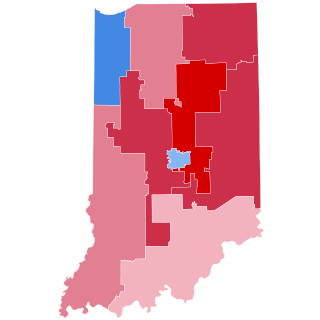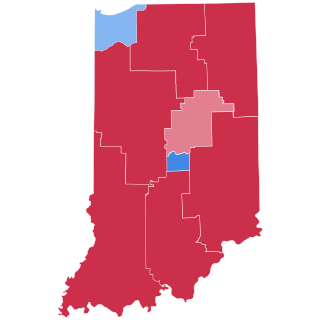
Julia May Carson was an American politician who served as a member of the United States House of Representatives for Indiana's 7th congressional district from 1997 until her death in 2007. Carson was the first woman and first African American to represent Indianapolis in the U.S. Congress. She was also the second African American woman elected to Congress from Indiana, after Katie Hall, and her grandson André Carson succeeded to her seat following her death.

Kansas' 2nd congressional district is a congressional district in the U.S. state of Kansas that covers most of the eastern part of the state, except for the core of the Kansas City Metropolitan Area. The district encompasses less than a quarter of the state. The state capital of Topeka, the cities of Emporia, Junction City and Leavenworth and most of Kansas City are located within this district. The district is currently represented by Republican Jake LaTurner.

South Carolina's 2nd congressional district is in central and southwestern South Carolina. The district spans from Columbia to the South Carolina side of the Augusta, Georgia metropolitan area.

Indiana's 4th congressional district is a congressional district in the U.S. state of Indiana. From 2003 to 2013 the district was based primarily in the central part of the state, and consisted of all of Boone, Clinton, Hendricks, Morgan, Lawrence, Montgomery, and Tippecanoe counties and parts of Fountain, Johnson, Marion, Monroe, and White counties. The district surrounded Indianapolis including the suburban area of Greenwood and encompassed the more exurban areas of Crawfordsville and Bedford, as well as the college town of Lafayette-West Lafayette, containing Purdue University.
Arizona's 2nd congressional district is a congressional district located in the U.S. state of Arizona. The district is in the north eastern part of the state and includes Apache, Coconino, Gila, Navajo, and Yavapai counties in their entirety and portions of Graham, Maricopa, Mohave, and Pinal counties. The largest city in the district is Flagstaff.
New York's 15th congressional district for the United States House of Representatives is located in New York City, State of New York. The district has been represented by Democrat Ritchie Torres since 2021.

New York's 25th congressional district is a congressional district for the United States House of Representatives. It is currently represented by Democrat Joseph Morelle. Since 2023, the district has been located within Monroe County and part of Orleans County, centered on the city of Rochester.

The 2004 United States presidential election in Indiana took place on November 2, 2004, and was part of the 2004 United States presidential election. Voters chose 11 representatives, or electors to the Electoral College, who voted for president and vice president.

Pennsylvania's 12th congressional district is located in southwestern Pennsylvania, including Pittsburgh and much of Allegheny County, as well as some of Westmoreland County. Since January 3, 2023, it has been represented by Summer Lee.

Indiana's 7th congressional district is a congressional district in the U.S. state of Indiana. It is entirely located within Marion County and includes most of Indianapolis, except for the southern side, which is located within the 6th district.

Missouri's 6th congressional district takes in a large swath of land in northern Missouri, stretching across nearly the entire width of the state from Kansas to Illinois. Its largest voting population is centered in the northern portion of the Kansas City metropolitan area and the town of St. Joseph. The district includes much of Kansas City north of the Missouri River.

Connecticut is divided among five congressional districts from which citizens elect the state's representatives to the United States House of Representatives. After the re-apportionment following the 2000 census, Connecticut lost one representative, reducing the state's delegation from six to five. The redistricting process was shared between the Republican governor at the time, John G. Rowland, and the Democratic-controlled General Assembly. Before the census, the state's House delegation was split evenly between Republicans and Democrats, and the solution finally agreed upon by the redistricting committee would ensure an even match-up between incumbents, the 6th district's Nancy L. Johnson, a Republican, and the 5th district's James H. Maloney, a Democrat. In the 2002 elections, Johnson defeated Maloney by a surprisingly large margin in the new 5th district.

The 2008 congressional elections in Indiana were held on November 4, 2008 to determine who will represent the State of Indiana in the United States House of Representatives. Indiana has nine seats in the House, apportioned according to the 2000 United States census. Representatives are elected for two-year terms; those elected will serve in the 111th Congress from January 3, 2009 until January 3, 2011. The elections coincide with the 2008 U.S. presidential election.

The 2008 United States presidential election in Indiana took place on November 4, 2008, and was part of the 2008 United States presidential election. Voters chose 11 representatives, or electors to the Electoral College, who voted for president and vice president.
Indiana has long been considered to be a Republican stronghold and is rated R+11 on the Cook Partisan Voting Index. The current governor of Indiana is Republican Eric Holcomb, and Republicans hold supermajorities in both chambers of the Indiana General Assembly. It has only supported a Democrat for president four times since 1912—in the elections of 1932, 1936, 1964, and 2008. Historically, the state was a swing state, voting for the national winner all but four times from 1816 to 1912, with the exceptions of 1824, 1836, 1848, and 1876.

The 2006 congressional elections in Indiana were elections for Indiana's delegation to the United States House of Representatives, which occurred along with congressional elections nationwide on November 7, 2006. Indiana played an important role in helping Democrats sweep Congress, when three Republican incumbents were defeated:, giving the Democrats a majority of the delegation again. Republicans held a majority of Indiana's delegation, 7–2, before the elections.

The 2004 congressional elections in Indiana were elections for Indiana's delegation to the United States House of Representatives, which occurred along with congressional elections nationwide on November 2, 2004. Republicans held a majority of Indiana's delegation, 6-3, before the elections. The only incumbent to lose re-election was Democrat Baron Hill, who lost to Republican Mike Sodrel in the 9th district.

The 2010 congressional elections in Indiana were held on November 2, 2010, to determine who would represent the state of Indiana in the United States House of Representatives. Representatives are elected for two-year terms; those elected served in the 112th Congress from January 2011 until January 2013, except for the winner of the 3rd District's special election, who will serve the few remaining weeks of the 111th Congress. As of 2023 this is the last time that the Democrats won more than 2 seats in Indianas house delegation.

The 2020 United States House of Representatives elections in Indiana were held on November 3, 2020, to elect the nine U.S. representatives from the state of Indiana, one from each of the state's nine congressional districts. The elections coincided with the 2020 U.S. presidential election, as well as other elections to the House of Representatives, elections to the United States Senate and various state and local elections.

The 2022 United States House of Representatives elections in Indiana were held on November 8, 2022, to elect the nine U.S. representatives from the state of Indiana, one from each of the state's nine congressional districts. The elections coincided with other elections to the U.S. House of Representatives, elections to the U.S. Senate, and various state and local elections. Primary elections took place on May 3.


















